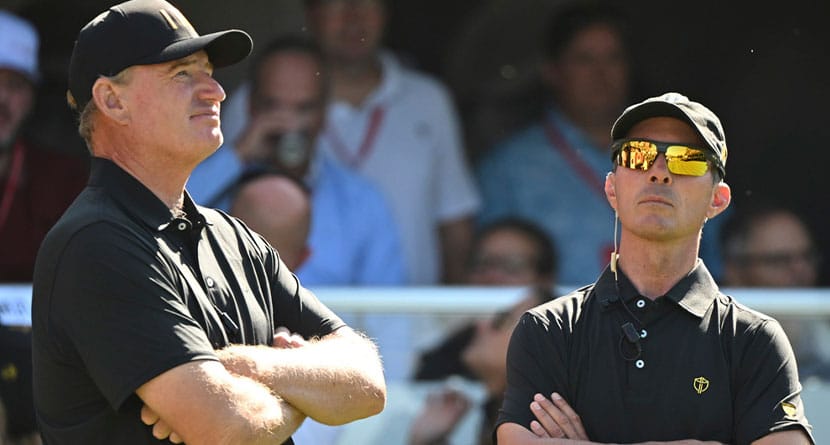MONTREAL (AP) — History will show the Presidents Cup began in 1994 when the PGA Tour decided the best players born outside Europe needed a competition similar to the Ryder Cup. The 15th edition is now in the books. The Internationals still only have one win.
Some competition.
Yes, the Presidents Cup is still young compared with the Ryder Cup, which dates to 1927. But a case can be made it’s actually even younger than that.
Bringing together players from five continents — sometimes as many languages — and telling them they represent a flag only seen once every two years doesn’t seem like a fair fight. Now it does. The Internationals didn’t really become a team until five years ago when Ernie Els helped them craft a real identity with a new logo — The Shield — along with a sense of purpose.
That was in 2019, a big change. But so far, that’s been the only change.
“I had a great feeling for this team coming in,” Adam Scott of Australia said. “I felt like there’s been an evolution under this shield the last two cups — four or five years of that — and buy-in from all the international players. It’s something they aspire to play for.
“The result, unfortunately, is the same,” Scott said. “Hopefully, this competition inspires all of us sitting up here to play really hard, go one with our careers the next two years, win big events, and come back better prepared and ready to win in Chicago.”
That’s all they can ever do — wait until next time.
The Internationals resemble the “Peanuts” character Charlie Brown charging toward the football, convinced this will be the time he gets to kick it, only for Lucy to pull it away and Charlie Brown lands flat on his back.
They have to win one. It’s bound to happen.
“Winning doesn’t last forever,” Tom Kim said. “There’s eventually times when you’re going to lose. There’s going to be times where lip-outs are going to go our way — a few breaks, a few bounces are going to go our way.”
The longer this goes on, the less likely it seems it will happen. The more a team wins, the easier it gets. One American swing coach was watching the players relaxed as ever during a practice round in South Korea in 2015 and remarked, “I wish we could be this way in the Ryder Cup.”
But they aren’t. The Americans always win the Presidents Cup. In 2015, they had lost the Ryder Cup three times in a row, and six out of the last seven.
An argument can be made that Americans play to win in the Presidents Cup because that’s what they always do. They play not to lose the Ryder Cup, and they often do.
“The matches come down to just some special moments,” U.S. captain Jim Furyk said. “For one reason or another, these guys usually play loose in the Presidents Cup. They let it fly. And we’ve been able to win some crucial points, make some crucial putts.”
The seven-point difference at Royal Montreal — 18 1/2-11 1/2 — was the biggest road win for the Americans. And yet 13 matches were decided on the 18th hole, the most of any Presidents Cup since that one-point win in South Korea.
All the Internationals need is one win to change the dynamics.
Geoff Ogilvy is the obvious candidate to be the next International captain. Never mind that Ogilvy led the redesign of Medinah for the 2026 matches. He had a 23-5 record in match play, winning the Match Play Championship twice (he lost in the finals another time) and winning all three of his singles matches in the Presidents Cup (twice against Steve Stricker).
It was Ogilvy who said at the start of the week at Royal Montreal, “To beat the U.S. team in an event like this is the pinnacle of sport.”
“If we can bring a group of guys from around the world and come and beat them, I can’t imagine anything better than that,” he said.
But is one win really enough?
Els was part of the Internationals’ shellacking of the Americans at Royal Melbourne in 1998, still their only win. The Americans beat them even worse at home the next time. Then came the tie in South Africa, followed by 2005 when the U.S. won on the last putt of the last match.
That was the start of the Americans winning 10 in a row. So how did a competition go from being so close to so lopsided?
Els referred to a “golden moment” for the International side, when three players from the “Big Five” of the mid-2000s were Els, Vijay Singh and Retief Goosen. It used to be even stronger. When the Presidents Cup began in 1994, five of the top 12 players in the world were eligible for the International team.
This time they had two in the top 20 — Hideki Matsuyama and Scott.
These things can go in cycles.
“These guys may not rank very high in world ranking, but they’re coming,” Els said. “There’s a lot of good — great — talent here, so we’ve got to give this a little bit of time. When they start winning tournaments on the U.S. PGA Tour, their real confidence is going to come through.
“Give it a bit of time.”
For now — for two decades — that’s all the Internationals get is time. The Americans have the trophy, and plenty of belief about keeping it.




